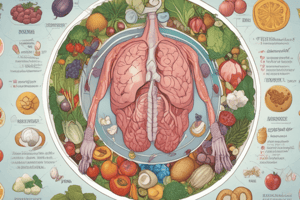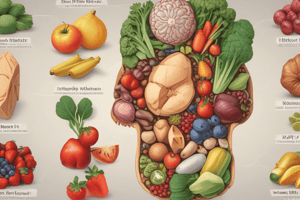Podcast
Questions and Answers
What percentage of daily calories should come from carbohydrates?
What percentage of daily calories should come from carbohydrates?
- 20-30%
- 70-80%
- 45-65% (correct)
- 30-40%
What is the main function of proteins in the body?
What is the main function of proteins in the body?
- Provide energy for the body
- Build and repair body tissues (correct)
- Maintain healthy skin
- Regulate body temperature
What type of fat is typically liquid at room temperature?
What type of fat is typically liquid at room temperature?
- Saturated fat
- Unsaturated fat (correct)
- Trans fat
- Monounsaturated fat
What is the term for the recommended daily nutrient intake to meet the nutrient needs of 97-98% of healthy individuals?
What is the term for the recommended daily nutrient intake to meet the nutrient needs of 97-98% of healthy individuals?
What is the term for inadequate or excessive nutrition, leading to health problems?
What is the term for inadequate or excessive nutrition, leading to health problems?
What is the name of the nutrition guide developed by the United States Department of Agriculture (USDA)?
What is the name of the nutrition guide developed by the United States Department of Agriculture (USDA)?
Flashcards are hidden until you start studying
Study Notes
Macronutrients
- Carbohydrates: Provide energy for the body, 45-65% of daily calories
- Simple carbs: sugars, found in fruits, milk, honey
- Complex carbs: starches, found in grains, vegetables, fruits
- Proteins: Build and repair body tissues, 15-20% of daily calories
- Essential amino acids: cannot be produced by the body, must be consumed
- Non-essential amino acids: can be synthesized by the body
- Fats: Provide energy, absorb vitamins, and maintain healthy skin, 20-35% of daily calories
- Saturated fats: typically solid at room temperature, found in animal products and some plant-based sources
- Unsaturated fats: typically liquid at room temperature, found in nuts, seeds, and avocados
Micronutrients
- Vitamins: Organic compounds essential for various bodily functions
- Fat-soluble vitamins: A, D, E, K
- Water-soluble vitamins: B, C
- Minerals: Inorganic elements essential for various bodily functions
- Macro-minerals: calcium, phosphorus, magnesium, sodium, potassium, chloride
- Micro-minerals: iron, zinc, iodine, selenium, copper
Nutrition Recommendations
- Dietary Reference Intake (DRI): established by the National Academy of Sciences
- Recommended Dietary Allowance (RDA): daily nutrient intake to meet the nutrient needs of 97-98% of healthy individuals
- Adequate Intake (AI): recommended daily nutrient intake when there is not enough scientific evidence to establish an RDA
- MyPlate: a nutrition guide developed by the United States Department of Agriculture (USDA)
- Emphasizes whole grains, fruits, vegetables, lean proteins, and low-fat dairy products
Nutrition Deficiencies and Disorders
- Malnutrition: inadequate or excessive nutrition, leading to health problems
- Deficiency diseases: caused by a lack of essential nutrients
- Scurvy (vitamin C deficiency)
- Rickets (vitamin D deficiency)
- Anemia (iron deficiency)
- Eating disorders: psychological disorders characterized by abnormal eating habits
- Anorexia nervosa
- Bulimia nervosa
- Binge eating disorder
Macronutrients
- Carbohydrates provide energy for the body, making up 45-65% of daily calories
- Simple carbohydrates are sugars found in fruits, milk, and honey
- Complex carbohydrates are starches found in grains, vegetables, and fruits
- Proteins build and repair body tissues, making up 15-20% of daily calories
- Essential amino acids cannot be produced by the body and must be consumed
- Non-essential amino acids can be synthesized by the body
- Fats provide energy, absorb vitamins, and maintain healthy skin, making up 20-35% of daily calories
- Saturated fats are typically solid at room temperature and found in animal products and some plant-based sources
- Unsaturated fats are typically liquid at room temperature and found in nuts, seeds, and avocados
Micronutrients
- Vitamins are organic compounds essential for various bodily functions
- Fat-soluble vitamins include A, D, E, and K
- Water-soluble vitamins include B and C
- Minerals are inorganic elements essential for various bodily functions
- Macro-minerals include calcium, phosphorus, magnesium, sodium, potassium, and chloride
- Micro-minerals include iron, zinc, iodine, selenium, and copper
Nutrition Recommendations
- Dietary Reference Intake (DRI) is established by the National Academy of Sciences
- Recommended Dietary Allowance (RDA) is the daily nutrient intake to meet the needs of 97-98% of healthy individuals
- Adequate Intake (AI) is the recommended daily nutrient intake when there is not enough scientific evidence to establish an RDA
- MyPlate is a nutrition guide developed by the USDA, emphasizing whole grains, fruits, vegetables, lean proteins, and low-fat dairy products
Nutrition Deficiencies and Disorders
- Malnutrition is inadequate or excessive nutrition, leading to health problems
- Deficiency diseases are caused by a lack of essential nutrients
- Scurvy is a disease caused by vitamin C deficiency
- Rickets is a disease caused by vitamin D deficiency
- Anemia is a disease caused by iron deficiency
- Eating disorders are psychological disorders characterized by abnormal eating habits
- Anorexia nervosa is an eating disorder
- Bulimia nervosa is an eating disorder
- Binge eating disorder is an eating disorder
Studying That Suits You
Use AI to generate personalized quizzes and flashcards to suit your learning preferences.




